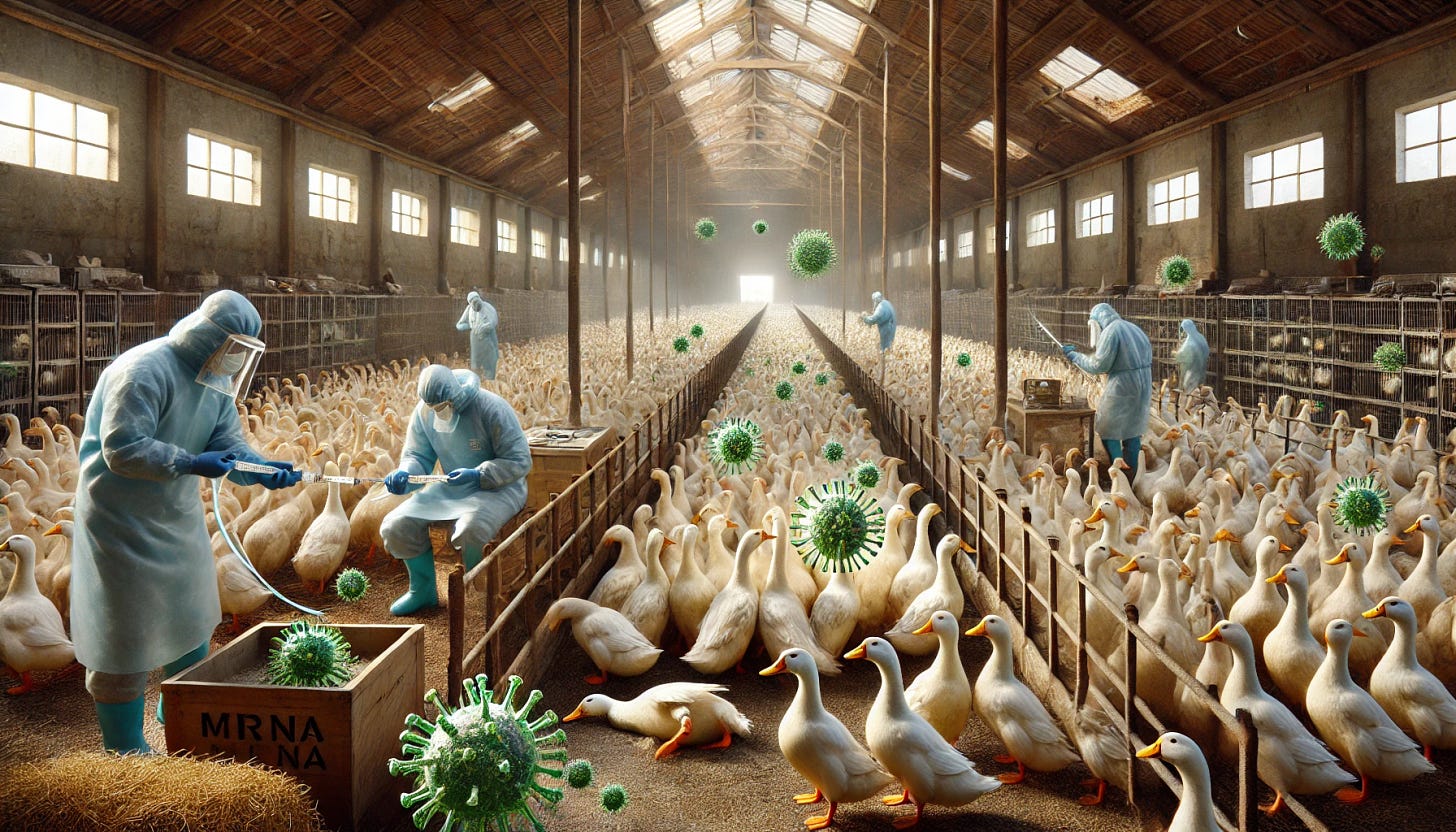French Authorities Mandate Self-Amplifying mRNA Injections and a Third Booster Dose for Ducks Against Bird Flu
Risks of viral mutations, breakthrough infections, and human health concerns from mRNA residues in meat are ignored by public health officials.
By Nicolas Hulscher, MPH
Esteemed researcher Hélène Banoun has just published an article titled, Duck vaccination against bird flu in France, that provides a comprehensive overview of the reckless mass avian influenza duck vaccination campaign. Here are the key points:
1. Introduction to Duck Vaccination Campaign in France
France is the only country mandating vaccination of ducks against H5N1 avian influenza for farms with over 250 ducks.
The vaccine campaign was launched in autumn 2023, targeting 61 million ducks annually, using both CEVA's self-amplifying mRNA vaccine and Boehringer's subunit vaccine.
Farms with fewer than 250 ducks are prohibited from vaccinating.
Despite being the only nation enforcing mass duck vaccination, no evidence exists of stringent safety measures to prevent vaccine residues in meat, nor transparency in pharmacokinetic studies.
2. Vaccine Types and Selection Process
Two vaccines were tested and approved:
Boehringer Ingelheim's subunit vaccine: Traditional inactivated H5 subunit vaccine.
CEVA's self-amplifying mRNA vaccine: Encapsulated in ferric nanoparticles, contains squalene, and requires precise storage.
Initially, only Boehringer's vaccine was approved due to logistical constraints with CEVA's storage requirements. In 2024, authorities purchased doses from both companies.
The introduction of CEVA's mRNA vaccine in food-producing animals raises significant concerns due to the lack of biodistribution and pharmacokinetic studies, as well as potential squalene toxicity in humans.
3. Vaccine Efficacy and Viral Shedding
Viral shedding continues for up to 14 days, even in vaccinated ducks.
In trials, vaccinated ducks still excreted the virus in significant amounts, posing ongoing risks for viral mutation and transmission.
Vaccination fails to prevent virus shedding effectively, undermining the justification for mandatory mass vaccination and raising the risk of silent virus propagation.
4. Risks of Vaccine-Induced Mutations
Vaccination can drive viral evolution, favoring more virulent or vaccine-resistant strains, as seen in China with H5N1.
Incomplete protection encourages silent spread, where infected but vaccinated birds show minimal symptoms while still excreting the virus.
Evidence suggests that vaccination does not prevent the emergence of more pathogenic variants, contradicting the core objective.
5. Breakthrough Infections on Vaccinated Farms
Despite widespread vaccination, outbreaks occurred in vaccinated flocks in late 2024, including confirmed cases in Landes and Eure.
Affected areas implemented strict containment measures, including mass culling and trade restrictions.
Breakthrough infections undermine the credibility of the vaccination strategy, as the measures required to contain outbreaks mirror those used before vaccination campaigns began.
6. Regulatory and Ethical Concerns
The French Ministry of Agriculture mandated a third dose for mulard ducks, despite only two doses being approved under the vaccine's ATU (Temporary Use Authorization).
The introduction of off-label dosing protocols creates significant ethical and liability concerns, exposing veterinarians and producers to potential legal repercussions.
7. Human Health Risks from mRNA Vaccine Residues
CEVA’s self-amplifying mRNA may persist in duck tissues due to lipid nanoparticle (LNP) encapsulation, which protects mRNA from gastric degradation
Poorly cooked duck meat could theoretically deliver intact mRNA particles to consumers, raising concerns about inadvertent human “vaccination”.
No biodistribution or pharmacokinetic studies have been conducted to assess these risks.
The absence of pharmacokinetic studies represents a grave regulatory failure, as the long-term risks of mRNA ingestion remain unknown.
8. Broader Implications
Poultry vaccination is not accepted internationally for export, limiting market access for French producers.
Vaccination campaigns continue without evidence of significant improvement in outbreak control.
France risks economic and public trust damage while pursuing a strategy unsupported by international best practices.
Conclusion
The compulsory duck vaccination program in France reveals significant scientific, ethical, and regulatory concerns:
Limited vaccine efficacy with persistent viral shedding.
Risk of viral mutation driven by vaccination pressure.
Human health risks associated with mRNA residues in duck meat.
Breakthrough infections proving the campaign's limitations.
Legal ambiguities regarding off-label vaccination practices.
This paper indicates that mass animal avian influenza vaccination campaigns must never be initiated in the United States as is currently being pushed for by ‘experts’. The large number of risks far outweigh any theoretical benefits.
Nicolas Hulscher, MPH
Epidemiologist and Foundation Administrator, McCullough Foundation
www.mcculloughfnd.org
Please consider following the McCullough Foundation and Nicolas Hulscher on X (formerly Twitter) for further content.






This treatment of animals is criminal.
You know the world is completely fucked up when they’re force-jabbing the ducks. DUCK LIVES MATTER! Leave the ducks alone